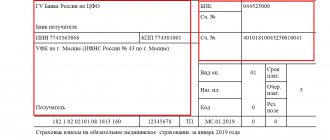The compulsory insurance system involves: insurers - Pension Fund, Federal Compulsory Medical Insurance Fund and Social Insurance Fund; insured persons - individuals whose income is subject to contributions, entitled to benefits, free medical care and pensions; insurers - organizations and individuals making payments and other benefits to employees (Article 419 of the Tax Code of the Russian Federation).
The object of taxation of insurance premiums for payers of insurance premiums are payments and other remunerations accrued in favor of individuals subject to compulsory social insurance.
The object of taxation of insurance premiums for organizations is payments and remuneration in favor of individuals, in particular, under employment contracts and civil law contracts, the subject of which is the performance of work or the provision of services (clause 1 of Article 420 of the Tax Code of the Russian Federation).
Among the persons working under an employment contract, the laws on the relevant types of compulsory insurance, to which the authors of the commented letter refer, indicate heads of organizations who are the only participants (founders), members of organizations, and owners of their property. This means that these persons are classified as insured persons.
Who needs to submit insurance premium payments?
The obligation to submit calculations for insurance premiums is assigned to:
- Organizations (including foreign companies operating in Russia), as well as separate divisions of organizations;
- Entrepreneurs who make payments to individuals.
In this case, the calculation is presented regardless of the status of the insured persons to whom the above-mentioned persons pay remuneration, that is:
- Employees with whom employment contracts have been concluded;
- General Director (sole founder);
- An individual with whom a civil contract has been concluded, for example, a contract, a contract for the provision of services.
Let's consider organizations and entrepreneurs that have no employees and have suspended their activities. Tax authorities provide clarification on this issue. They proceed from the fact that upon registration an organization receives the status of an employer, so they are required to provide a report even if they do not conduct activities and do not have employees.
Important! Even if the organization has no employees and does not conduct business, they are required to submit a zero calculation for insurance premiums. This requirement does not apply to entrepreneurs. They must submit a zero calculation if they have employees who are not paid wages.
As for entrepreneurs, the situation with them is somewhat different. Entrepreneurs must submit a report only if they have employees. But in some cases, entrepreneurs still have to submit a zero report. For example, if an individual entrepreneur has an employee, but because he is on vacation at his own expense. In this case, you still need to provide a report, but it will only be zero. After all, even if the employee does not receive income, but only benefits, he still remains an insured person.
What should be reflected in section 3 of the zero calculation of contributions?
Section 3 contains information on each person insured in the compulsory health insurance system. In this case, it does not matter whether there were accruals in his favor in the reporting period or not (clause 20.1 of the Filling Out Procedure). Thus, the zero calculation for insurance premiums in Section 3 may include either employees who do not receive remuneration from their employer, for example due to being on unpaid leave, or a director - the only founder who also does not receive wages.
Subsection 3.1 contains information about whether the form is initial or corrective, the reporting period code, year, serial number and date of submission of information. Next comes the indication of all the data of the individual: TIN, SNILS, full name, date of birth, gender, code and details of the identity document, sign of the insured person in the OPS and Compulsory Medical Insurance systems.
Subsection 3.2 contains information about the amounts:
- remuneration in favor of individuals;
- accrued contributions to compulsory pension insurance.
According to clause 20.2 of the above Procedure, when submitting a zero calculation, subsection 3.2 is not filled out. However, you can also fill it out with zero values. The standard settings of most accounting programs are such that when you leave at your own expense, subsection 3.2 is automatically generated. The program will put down:
- in line 190 - months of the reporting period;
- in line 200 - code “НР”;
- Lines 210–240 print zeros.
Calculations with this design undergo format and logical control and are accepted by tax authorities.
If during the reporting period there were accruals to employees, as well as to individuals who performed services (work) under civil contracts, the employer will have to fill out a report in accordance with all the rules. ConsultantPlus experts explained in detail how to fill out the calculation correctly. Get free demo access to K+ and go to the Ready Solution to find out all the details of this procedure.
Procedure for filling out the zero calculation
The zero calculation form is used the same as for filling out the calculation with indicators, that is, the form approved on October 10, 2016 No. ММВ-7-11/ [email protected] In addition to the title page, the sections are filled out as follows:
- Section 1: the BCC for contributions is indicated, the remaining lines are filled with zeros and dashes. If the report is filled out electronically, then there is no need to enter a zero or a dash in the empty cells;
- Section 1, Appendix 1, subsection 1.1 and 1.2: the number of insured employees under medical and pension insurance is indicated. If there are no employees, zeros are entered;
- Section 1, Appendix 2: the number of insured workers under social insurance is indicated;
- Section 3, subsection 3.1: full name, INN, SNILS for employees with whom employment contracts and contract agreements have been concluded are indicated. Lines 160-180 contain information about whether the employee is insured or not, depending on this, sign 1 or 2 is indicated.
In addition to the report itself, it is accompanied by an explanation that no activities were carried out in the organization and no salaries were accrued. Based on this, insurance premiums were not calculated. It is not necessary to prepare such an explanation, but tax authorities may require information on the zero report (
Can an LLC function without employees?
The organization may not have an accountant, sales manager or other hired employees. But if there are signatures in the company’s contracts and reports, there must be someone who signs them.
Even when registering an LLC, the founders must choose a sole executive body - a director. Even if an LLC is created with a minimum authorized capital, does not have a single employee and has not started operating at all, a director must be elected immediately. Information about it enters the Unified State Register of Legal Entities and is stored there throughout the organization’s operation. If the company is left without a general director, then the register contains incorrect information - they must be immediately replaced with the data of the new executive body; simply crossing out the old information will not work.
It happens that an LLC has one founder, who is also the head of the organization. It is not necessary to conclude an employment contract with him; a decision of the sole participant to appoint himself as a director and an order to assume the position are sufficient (letter of the Ministry of Labor of Russia dated 03/24/2020 No. 14-2/B-293, Rostrud dated 03/06/2013 No. 177-6-1 ). But having an employment contract will help you avoid unnecessary questions from the State Tax Service and the Federal Tax Service. Moreover, judging by judicial practice, the absence of an employment contract with the sole participant director does not mean the absence of labor relations. That is, the founder will still be considered an employee (Decision of the Supreme Court dated October 21, 2019 No. 78-KG19-33, Resolution of the Eighth Court of Cassation dated June 29, 2020 No. 16-3609/2020).
Another important question is whether the founding director should be paid a salary. This will also impact the organization's reporting rate. If there is no employment contract, wages may not be paid. According to the tax authorities, the founder can decide for himself whether he wants to receive money. He can write a statement and refuse the reward (resolution of the Ninth Arbitration Court of Appeal dated December 20, 2018 No. 09 AP-48934/2018). If there is an employment contract and no salary, the State Tax Inspectorate sometimes issues fines, but inspectors practically do not come to such LLCs - the directors do not complain about themselves.
To summarize, the question of the possibility of an LLC existing without employees has not yet been closed. Regulatory authorities and courts periodically have contradictions. But it’s always safer to submit a little more reports and pay a little more money to the budget. This will help avoid problems.
How to provide a zero settlement
You can provide a zero calculation either electronically or in paper form. The requirement to submit a report only in electronic form applies to organizations with more than 25 employees. You can submit a calculation on paper in the following ways:
- personally, this can be done by the manager or a person with the appropriate power of attorney;
- by post, in this case the letter is sent with a description of the attachment and notification of its delivery.
How can an LLC without employees avoid fines?
The law does not provide clear guidance on whether an LLC can operate without employees. Letters and explanations from regulatory authorities contradict each other, and judicial practice does not add clarity. We have sorted out the current situation. An LLC must have at least a founding general director, with whom there is no need to enter into an employment contract or pay a salary. However, he will still be considered an insured person and will be reflected in a number of employee reports.
To avoid fines, carefully monitor changes in laws. The requirements of controllers can change at any time, then you will have to either urgently correct them or pay fines.
The safest option is to employ a director in the LLC according to all the rules and pay him at least the minimum salary. Even one well-trained employee will help avoid conflicts with inspectors.
Also, don't forget about reporting. There are also fines for failure to submit or late submission. Failure to pass SZV-M and SZV-STAZH will cost at least 500 rubles, RSV and 4-FSS - 1000 rubles.
The legislative framework
| Legislative act | Content |
| Letter of the Federal Tax Service of Russia No. 03-11/6940 dated 04/12/2017 | “On registration of labor relations with the general director - the sole participant of the LLC, as well as the calculation of dividends and payment of personal income tax on them” |
| Letter of the Federal Tax Service of Russia No. BS-4-11/6940 dated 04/12/2017 | “On the submission of calculations for insurance premiums in the absence of payments in favor of individuals, its composition and procedure for filling out” |
| Letter of the Federal Tax Service of Russia No. BS-4-11/6174 dated 04/03/2017 | “On the issue of submitting calculations for insurance premiums” |
Deadlines for submitting reports for LLCs without employees
We have collected the deadlines for submitting all reports for LLCs with a simplified taxation system and without employees in the table:
| Reporting | Where to take it | Deadline |
| Declaration according to the simplified tax system | To the Federal Tax Service at the location | Annually - no later than March 31 |
| Financial statements | To the Federal Tax Service at the location | Annually - no later than March 31 |
| Calculation of insurance premiums | To the Federal Tax Service at the location | Quarterly No later than the 30th day of the month following the reporting period (quarter, half-year, 9 months, year) |
| 4-FSS | Territorial body of the Social Insurance Fund at the place of registration | Quarterly Paper form - no later than the 20th day of the month following the reporting period Electronic form - no later than the 25th day of the month following the reporting period |
| SZV-STAZH | Territorial body of the Pension Fund of Russia | Annually - no later than March 1 of the year following the reporting year |
| SZV-M | Territorial body of the Pension Fund of Russia | Monthly - no later than the 15th day of the month following the reporting month |
What to do with a SZV-M filed against a “non-contractual” director?
Organizations that do not conduct financial and economic activities are puzzled by the fate of SZV-M already handed over for April - June 2021. After all, in these reports they indicated their founding directors, with whom employment contracts were not drawn up. Should I leave everything as is or cancel these reports?
Pension Fund specialists advise you to do this.
FROM AUTHENTIC SOURCES
“Organizations that do not carry out activities do not need to cancel the SZV-M for April - June 2021, which indicates the founding directors with whom employment or civil law contracts have not been drawn up. Such organizations do not face a fine for providing false information. If organizations still decide to submit SZV-M with the form type “cancel”, then in this case I will not fine them either.
PRYGOVA Olga Igorevna PFR
CONCLUSION
The choice is yours: if you want, cancel SZV-M, if you want, no. But remember that SZV-M was introduced to identify working pensioners (their pensions are not indexed). Therefore, if the “non-contractual and unpaid” founding director is a pensioner, it is better to hurry up with the cancellation of the report.
What should operating companies do if the director does not have a contract?
Organizations that conduct financial and economic activities did not find any clear explanations addressed to them in letters or memos from the Pension Fund of Russia. But even among them there are companies in which an employment contract has not been concluded with the director - the sole founder. Don't they also need to indicate the director in SZV-M?
FROM AUTHENTIC SOURCES
“ To resolve the issue of the need to submit a report in the SZV-M form, the presence of a valid written employment contract is decisive. Or a GPC agreement, which involves the calculation of insurance premiums. Therefore, the sole founder of an organization conducting financial and economic activities does not need to be included in the SZV-M if he performs the functions of a manager without concluding an employment or civil law contract. However, if such a founding director nevertheless receives a salary and pays insurance premiums from it, then we can talk about the actual existence of an employment relationship with the organization. After all, their occurrence is possible even without a formalized written employment contract and Letter of the Ministry of Labor dated 07/07/2016 No. 21-3/10/B-4587; PFR dated July 13, 2016 No. LCH-08-26/9856; Articles 15, 16 of the Labor Code of the Russian Federation. And under such circumstances, it is necessary to indicate the founding director in the SZV-M report.”
PRYGOVA Olga Igorevna PFR
In this regard, one cannot help but recall the risk that the labor inspectorate will consider the director, the only founder with whom an employment contract has not been concluded, to still have an employment relationship with the organization. And the fine for organizations for not concluding an employment contract with the director can be considerable - from 30,000 to 50,000 rubles. Part 1 Art. 5.27 Code of Administrative Offenses of the Russian Federation
CONCLUSION
As we can see, Pension Fund specialists do not differentiate between operating and non-operating firms. If the only founder manages without a contract (and without a salary), neither one nor the other needs to indicate him in the SZV-M.
- director is the sole founder;
- there is not a single employee in the organization with whom an employment or civil law contract was in force for at least one day in the reporting month.
LLC reporting on the simplified tax system in Externa
Extern is a web service for submitting reports to the tax authorities, funds, Rosstat, FSRAR and RPN. Organizations using the simplified tax system without employees will find in the system interface all the forms that they need to submit. The external student will tell you how to generate and submit reports in accordance with the requirements of the law.
To use the service, you will need an electronic signature and registration. All new users and clients who have lost access to Extern and have not used the system for more than a year will be able to take a test drive and try all the features of the service for free. In addition to submitting reports, other functions are available in Externa:
- reconciliation of settlements with counterparties;
- verification of counterparties;
- unlimited number of extracts from the Unified State Register of Legal Entities/Unified State Register of Individual Entrepreneurs;
- reference and legal system;
- educational webinars.
To prepare a report, select the appropriate section and how to create the form - fill it out in the system or download a ready-made report. The external student will give recommendations on how to fill out the report and check it for errors before sending it.
Initiative to introduce criminal liability for non-payment of insurance premiums
Do not forget that at the beginning of April 2021, bill No. 927133-6, providing for criminal liability for non-payment of insurance premiums, (modified by the Ministry of Justice) was approved by the government commission on legislative activities.
For non-payment of insurance premiums, it is planned to punish defaulting legal entities with fines from 200 thousand to 2 million rubles, and up to 300 thousand rubles for defaulting individuals. The maximum term of imprisonment is planned to be set at seven years.
A large amount for individuals is recognized as the amount of insurance contributions to extra-budgetary funds, amounting to more than 600 thousand rubles within three financial years in a row, provided that the share of unpaid insurance premiums exceeds 10% of the total amount of paid insurance premiums or exceeds 1,800 thousand rubles, and especially large in size - an amount amounting to more than 3 million rubles within three financial years in a row, provided that the share of unpaid insurance premiums exceeds 20% of the total amount of taxes (fees) paid, or exceeds 9 million rubles.
For legal entities, a large amount is recognized as the amount of insurance contributions to extra-budgetary funds, amounting to more than 2 million rubles within three financial years in a row, provided that the share of unpaid insurance premiums exceeds 10% of the total amount of paid insurance premiums or exceeds 6 million rubles. According to the bill, a particularly large amount is recognized as an amount amounting to more than 10 million rubles within three financial years in a row, provided that the share of unpaid insurance premiums exceeds 20% of the total amount of paid insurance premiums, or exceeds 30 million rubles.
Thus
, if this bill is adopted, criminal liability will be introduced for non-payment of insurance premiums in large and especially large amounts. The head of an organization, chief accountant, individual entrepreneur and other individuals can be brought to criminal liability.
"INSURANCE" DISPUTES. REVIEW OF JUDICIAL ACTS OF THE RF Armed Forces ON THE ISSUES OF PAYMENT OF INSURANCE PREMIUMS TO NON-BUDGETARY FUNDS
Wages accrued but not paid
A different situation arises when wages are accrued but not paid. It should be remembered that when concluding an employment contract with an individual (whether a director or another employee), the employer is obliged to pay wages and, accordingly, insurance premiums for the performed labor functions (Article 56 of the Labor Code of the Russian Federation).
For violation of the deadline for payment of wages, the employer must pay interest in an amount not less than 1/150 of the key rate of the Central Bank of the Russian Federation in force at that time (Article 236 of the Labor Code of the Russian Federation). In addition to financial losses, administrative liability is provided for the employer (Article 5.27 of the Code of Administrative Offenses of the Russian Federation).








